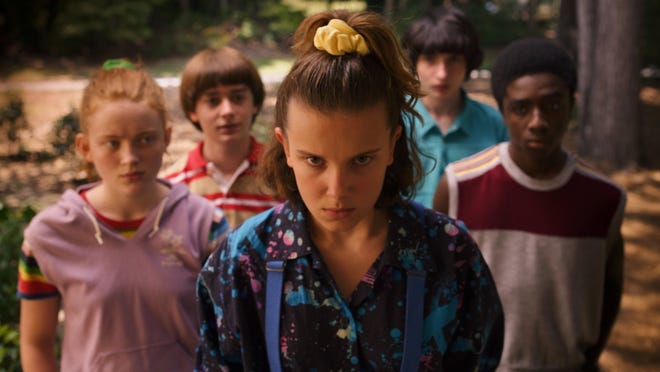
‘Stranger Things’ star on being sexualized
Millie Bobby Brown is opening up about the sexualization of young women in Hollywood, and how it has shaped her experience of growing up.
During an appearance on “The Guilty Feminist” podcast on April 4, the “Enola Holmes” star said in some ways, her coming-of-age experience isn’t much different from that of other teens her age.
“I deal with the same things any 18-year-old is dealing with, navigating being an adult and having relationships and friendships, and it’s all of those things,” Brown said. “Being liked and trying to fit in, it’s all a lot, and you’re trying to find yourself while doing that. The only difference is that obviously, I’m doing that in the public eye.”
But as a young woman in the public eye, Brown said the sexualization of her image is something she’s had to navigate. The “Stranger Things” star, who turned 18 this year, said she’s noticed “a difference between the way people act and the way the press and social media have reacted to me becoming of age.”
‘Stranger Things’ Season 4 trailer is full of surprises: What to know about penultimate season

2022 TV premieres, from ‘Stranger Things’ and ‘Grace and Frankie’ to ‘The Flight Attendant’
“I believe that shouldn’t change anything, but it’s gross and it’s true. It’s just a very good representation of what’s going on in the world and how young girls are sexualized,” Brown said. “So, I have been dealing with that, but I have also been dealing with that for forever.”
Brown recalled some of this early sexualization, citing the controversy she garnered for wearing a low-cut dress to an awards show when she was 16. “I thought, ‘My, is this really what we’re talking about? We should be talking about the incredible people that were there at the award show,’ ” she said.
Brown shot to fame at the age of 12, playing Eleven in Netflix’s “Stranger Things.” At 13, Brown was included in W magazine’s list of “Why TV Is Sexier Than Ever,” and men older than her have frequently commented on her looks online. A GQ profile from 2016 called her a “very grown-up child” and remarked on the appearance of her legs.
Related:How we’ve failed Millie Bobby Brown
Millie Bobby Brown tearfully recalls ‘uncomfortable’ fan encounter: ‘I’m a human being’
When Brown turned 16, she posted a message on Instagram chiding the media and the public for years of mistreatment.
“The last few years haven’t been easy, I’ll admit that,” Brown wrote at the time. “There are moments I get frustrated from the inaccuracy, inappropriate comments, sexualization and unnecessary insults that ultimately have resulted in pain and insecurity for me.”

Addison Rae was just the first: These TikTokers have their eye on Hollywood, too
Millie Bobby Brown isn’t the only young female star to deal with sexualization
The sexualization of girls and young women is pervasive, especially for those in the spotlight. In 2004, before Mary-Kate and Ashley Olsen were about to turn 18, websites featured clocks counting down until they became “legal.” Natalie Portman, who was frequently sexualized in her early roles, shared at the 2018 Women’s March that “a countdown was started on my local radio show to my 18th birthday – euphemistically, the date that I would be legal to sleep with.”
Portman noted on Dax Shepard’s “Armchair Expert” podcast in 2020 that “being sexualized as a child, I think, took away from my own sexuality, because it made me afraid.”
Healthy sexuality, according to the American Psychological Association, “is an important component of both physical and mental health, fosters intimacy, bonding and shared pleasure, and involves mutual respect between consenting partners.”
Natalie Portman: Being sexualized as ‘Lolita figure’ as a young actress ‘made me afraid’
Laura Palumbo, communications director at the National Sexual Violence Resource Center, said the adultification and sexualization of girls and young women deny them agency.
“It’s projected as a compliment – this is a sign of maturity that you are in some way set apart or different from other children and young women,” Palumbo previously told USA TODAY. “This is the way that society traps girls and young women because then it is this bind of whether you are worthy enough of the status that we’ve given you, whether or not you even wanted it.”
Hollywood is ignoring tween girls. ‘Turning Red’ shows why that needs to change.
Contributing: Alia E. Dastagir
